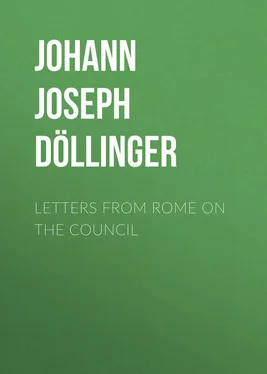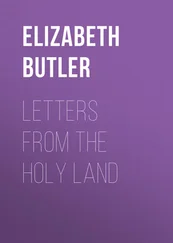Johann Döllinger - Letters From Rome on the Council
Здесь есть возможность читать онлайн «Johann Döllinger - Letters From Rome on the Council» — ознакомительный отрывок электронной книги совершенно бесплатно, а после прочтения отрывка купить полную версию. В некоторых случаях можно слушать аудио, скачать через торрент в формате fb2 и присутствует краткое содержание. Жанр: foreign_antique, foreign_prose, на английском языке. Описание произведения, (предисловие) а так же отзывы посетителей доступны на портале библиотеки ЛибКат.
- Название:Letters From Rome on the Council
- Автор:
- Жанр:
- Год:неизвестен
- ISBN:нет данных
- Рейтинг книги:3 / 5. Голосов: 1
-
Избранное:Добавить в избранное
- Отзывы:
-
Ваша оценка:
- 60
- 1
- 2
- 3
- 4
- 5
Letters From Rome on the Council: краткое содержание, описание и аннотация
Предлагаем к чтению аннотацию, описание, краткое содержание или предисловие (зависит от того, что написал сам автор книги «Letters From Rome on the Council»). Если вы не нашли необходимую информацию о книге — напишите в комментариях, мы постараемся отыскать её.
Letters From Rome on the Council — читать онлайн ознакомительный отрывок
Ниже представлен текст книги, разбитый по страницам. Система сохранения места последней прочитанной страницы, позволяет с удобством читать онлайн бесплатно книгу «Letters From Rome on the Council», без необходимости каждый раз заново искать на чём Вы остановились. Поставьте закладку, и сможете в любой момент перейти на страницу, на которой закончили чтение.
Интервал:
Закладка:
It is not the satisfaction of real religious needs that is contemplated – there would be no need to shun publicity in that case – but chartering dogmas which have no root in the common convictions of the Catholic world. Leibnitz used to call even the Council of Trent a “concile de contrabande;” the way in which this last Council is to be brought on the stage would make the designation for the first time fully applicable.
If these circumstances alone are enough to make Governments that have Catholic subjects suspicious of the designs of the Curia , there are also further proofs that their designs are not confined to strictly ecclesiastical affairs, but involve direct encroachment on the life of the modern State. Not to dwell here on the too open-hearted confidences of the Civiltà , which, although published with the approval of the Holy Father himself, have been characterized by him as an “imprudenza,” 4 4 [See Introduction to The Pope and the Council, pp. 1-4. – Tr.]
we will pass to other facts which sufficiently indicate the projected decrees of the Council.
To the inquiries of ambassadors about the reasons for summoning a General Council, Antonelli could only reply by referring to the great revolution and fundamental change in civil and political relations. It may be inferred from this declaration that the Council is intended to discharge a political office also, and in what sense, Rome has told us in the Syllabus and the condemnation of the Austrian Constitution. For this object an ecclesiastico-political consulting committee has been formed, subordinate to the Commission intrusted with the supreme control of the Council, with Cardinal Reisach at its head, and whose Italian members are as conspicuous for their want of scientific culture as for their opposition to any concession to the requirements of the age, and their hostility to all foreign countries, and especially to the non-Roman portions of Italy. The Syllabus will be put into shape in its affirmative form by this Section, in order thus to be submitted for sanction to the Council. One of its members lately expressed himself in the following terms, with the applause of his colleagues and of the Holy Father himself: – “The Syllabus is good, but raw meat, and must be carefully dressed to make it palatable.” This skilful dressing, which is to make it everywhere acceptable, it is hoped to effect by publishing the propositions in the form of exhortations, instead of commands, which, however, will come to the same thing, as the exhortations emanate from the head of the Church.
It is with good reason that Prince Hohenlohe, in his despatch, expresses the fear that the Council, according to the programme of the Curia , will publish decrees on political rather than ecclesiastical questions, and he rightly states that the projected dogma of Papal Infallibility is also an eminently political question. For when once that is defined, the mediæval pretension of the Pope to dominion over kings and nations, even in secular matters, which has never been abandoned, is thereby also raised to the rank of an article of divine faith. Thiers lately made the remarkable observation that the temporal power alone holds the Pope in check; – a monk, who was Pope, would think himself omnipotent. Certainly, without the temporal power, the maintenance of which depends on the goodwill of the French Government, and the administration of which keeps the Pope within a political area, he would give freer rein, when it was possible, to his views of the corruption of the modern State. Once seat a monk on the Papal throne, as many have already sat there, unacquainted with the actual world, and in heart alienated from it, and arm him with the prerogative of infallibility, – his decrees in the present condition of society are sure to evoke the most deplorable conflicts.
The ultramontane press in Germany, which is itself beginning to find the decisions sketched out by the Civiltà intolerable, now adopts the tactics of denying the official character of the Jesuit journal, and clings to the straw of hope that neither Papal Infallibility nor the Syllabus will be made dogmas. But it is no secret in Rome that those alarming communications of the Civiltà were letters written by French Jesuits, prepared and published with the sanction of the Holy Father himself, and cannot therefore be treated as mere chance contributions of private correspondents.
For several years past the Court of Rome, with the aid of its indefatigable allies the Jesuits, has been preparing the way for securing beforehand the votes of the Bishops on Papal Infallibility. Thus some years ago the Bishops of different countries received, quite unexpectedly, an urgent admonition from Rome to hold Provincial Synods, and frame decrees at them. These decrees had to be sent to Rome, to the Congregation exclusively charged with the revision of such ordinances, and were then returned, after correction and enlargement by the Cardinals and Committees of the Congregation. When they came to be printed, it was found that all these Synods had shown a wonderful unanimity in adopting Papal Infallibility as a self-evident principle into their exposition of universally known Catholic doctrine. The Jesuit organs have not failed to point triumphantly to these decisions of so many Bishops and Synods.
It is a fact that Antonelli publicly declared there could be no difficulty about the promulgation of Papal Infallibility, because it was a doctrine already held by all good Catholics. And this is the watchword of the whole ultramontane party at Rome. It is also a fact that the question was brought before the directing Commission in order to be put into shape, and then submitted for confirmation to the Council. And although it is certain that the discussion of it by the Commission is finished, the decision will be carefully kept secret for a time, because as yet courage fails them for a straightforward course of procedure, and they hope to gain their end by a sort of coup d'état , viz., carrying the dogma by spontaneous acclamation, to be evoked by a foreign prelate. 5 5 [Cf. The Pope and the Council , p. 6. – Tr.]
And thus Governments will be deprived of the opportunity of gaining any influence over the decisions of the Council, and protecting themselves against threatening eventualities.
Well-informed persons, who do not deny the intention of making Infallibility into a dogma, think that some innocuous formula will at last be discovered, such as prefixing a “quasi” to “infallibilis,” so that all the trouble expended in gratifying this darling wish of Pius ix. will be almost labour lost. But so long as the decision rests with the Jesuits, who have an overwhelming majority in the preparatory Congregation, there is no ground for this hope. They foresee the possibility of being again driven from the helm a few days after the death of the Pope, and therefore press for an unqualified definition, that they may make capital out of the infallible Pope for conquering a new position of influence for themselves in civilized Catholic countries. And if they could not reckon without some regard to other factors also, still their calculations had a good prospect of success, for Pius ix. is completely in the hands of the Jesuits, especially of Father Piccirillo, the chief person on the Civiltà staff, who will act as spiritus rector of the Council. The Pope is seldom left alone, lest he should fall under the influence of others who judge more correctly of the situation of the modern world and the real wants of the Catholic Church; he lives in an artificial atmosphere of homage poured forth by the ultramontane journals. He is so possessed with a sense of his own power that he believes he ought not to regard or fear any possible opposition of the French Government to the decisions of the Council.
Читать дальшеИнтервал:
Закладка:
Похожие книги на «Letters From Rome on the Council»
Представляем Вашему вниманию похожие книги на «Letters From Rome on the Council» списком для выбора. Мы отобрали схожую по названию и смыслу литературу в надежде предоставить читателям больше вариантов отыскать новые, интересные, ещё непрочитанные произведения.
Обсуждение, отзывы о книге «Letters From Rome on the Council» и просто собственные мнения читателей. Оставьте ваши комментарии, напишите, что Вы думаете о произведении, его смысле или главных героях. Укажите что конкретно понравилось, а что нет, и почему Вы так считаете.












